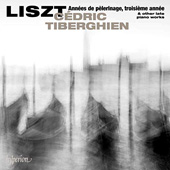

Bagatelle sans tonalité
Wiegenlied
Vierter Mephisto-Walzer
La lugubre gondola II
Schlaflos! Frage und Antwort
En rêve (Nocturne)
Années de pèlerinage, troisième année
Franz Liszt (1811-1886), whose work contributed immensely to the evolution of music during the 19th century, and whose life spanned the bridge from Beethoven to Mahler, arguably could be viewed as a slave or a casualty of his time. The first half of his life was wasted touring all over (like today's pop artists) as a virtuoso, a pianistic phenomenon, fabricated by the most fatuous and vacuous of publics, just like today's "boy band" fans. I swear if they had asked him to play the piano while standing on his head he would have obliged them. This is not to say that his virtuosity was fake. Quite the opposite as it was astounding. But all of this activity, along with his romantic ideals, literary essays, religious devotion, and support for many other musicians and composers of his time, left him with hardly any time to expand on his own composition skills. Which is unfortunate because when you listen to these, along with more of his late piano works, it's obvious that he had much to offer.
As a matter of fact some of his late piano works are quite profound and visionary for their time, as if he'd become one with the piano, not as a circus prop but as a musical implement. Like anything else in life, only with time does a musical instrument reveal its secrets. A prime example is La lugubre gondola II, a piece whose catalyst was the death of Wagner. It incarnates a funeral procession of gondolas carrying the dead down a Venetian canal. Not only does it evoke the slow and silent passage of time, but actually transcends it. Some segments of the music leap forward to the atonal serial music systems established much later by Arnold Schoenberg who was only twelve when Liszt passed away. Nuages gris, not included in this recording, is another late piano work by Liszt that flirted - unknowingly? - with the twelve-tone system. French pianist Cédric Tiberghien well defines both the anguish and the sense of timeless repose equally present in this piece. And yes, some of these late piano works, like the Les jeux d'eaux à la Villa d'Este from the Années de pèlerinage III still impose strong technical demands on the pianist, but this time strictly to enhance the musical narrative, and not merely to impress, and Tiberghien well projects this as well.
Most of these pieces may very well be cloaked under the shadow of mortality, but they represent and encapsulate the music of a composer who lived at the service of others, and was only now facing life and his own mortality on his terms ... exploring the infinite universe that is music. And the way Cédric Tiberghien (and the recording engineers at Hyperion) allow the final, massive chord of the closing Sursum corda from the Années de pèlerinage III to slowly decay for close to 50 seconds, says it all.
Jean-Yves Duperron - February 2019